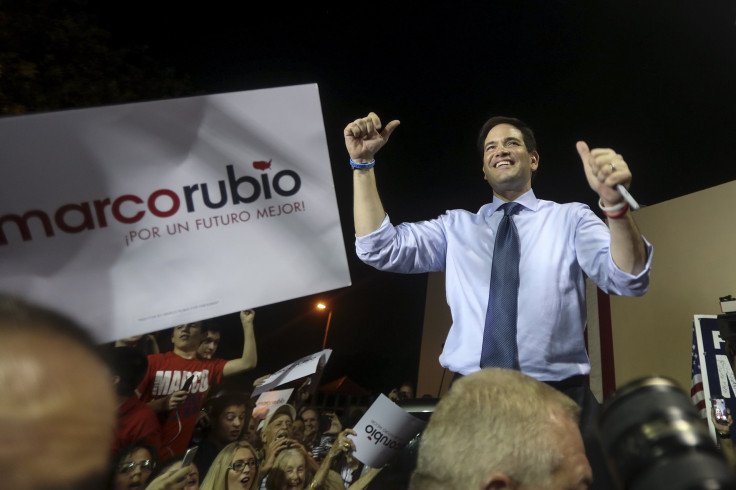Election 2016: Who Is Still In The Race? Marco Rubio Suspends His Campaign, John Kasich Watches Ohio Results

After his home state delivered a convincing victory to businessman Donald Trump, Florida Sen. Marco Rubio announced Tuedday evening the suspension of his campaign. Rubio said he would search for ways to repay his gratitude to the country and said "everything that comes from God is good ... God makes no mistakes."
That left Ohio Gov. John Kasich and Texas Sen. Ted Cruz the remaining Republicans to take on Trump. Kasich was trailing behind Rubio Tuesday in the delegate count, but after winning his home state he said he was in the race to the end. Ohio marked the first state won by Kasich.
Earlier Tuesday, Rubio had promised he would keep campaigning Wednesday no matter the results. “Tomorrow, our plan is to be in Utah campaigning irrespective of tonight,” Rubio said Tuesday speaking with Orlando sports talk station WDBO. “It would be a lot better to go to Utah being the winner of the Florida primary. It would give us a tremendous amount of momentum. It would give us 99 delegates, and that’s the way we want to do it tonight.”
Ahead of Tuesday's voting, Rubio said he could not “guarantee a win” in Florida, a state where Trump has residencies and businesses. With less than 1 percent of vote in, Trump took to Twitter with his usual bravado to declare a large victory. Trump had scorned Rubio as “little Marco” during the campaign, and Rubio struggled to respond to his attacks.
Word is that, despite a record amount spent on negative and phony ads, I had a massive victory in Florida. Numbers out soon!
— Donald J. Trump (@realDonaldTrump) March 15, 2016
Rubio had the support of 163 delegates after winning races in Minnesota, Washington, D.C., and Puerto Rico. Trump leads the delegate count with 469, followed by Cruz with 370. Kasich has 63.
Victory. Join our team as we march on. https://t.co/dy8KnZ122T -John pic.twitter.com/KOy15YmrjV
— John Kasich (@JohnKasich) March 16, 2016
For Kasich, picking up a win in Ohio helped buoy his candidacy, but with a much lower delegate count than Trump or Cruz, it remains unclear how Kasich will be able to catch up and position himself as the candidate to take on the front-runner. To gain the Republican nomination, 1,237 delegates are needed.
© Copyright IBTimes 2024. All rights reserved.












